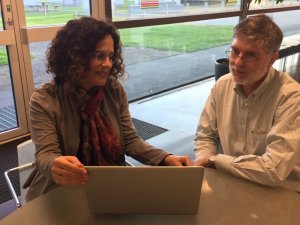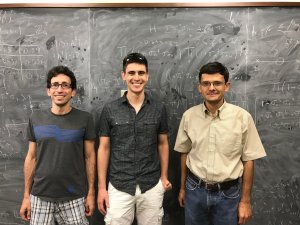
Bergmann Memorial Award Winners
Two Teams of Young Researchers Explore Sources of Knowledge and Matter
Knowledge in the brain and matter in the universe – these two subjects provoke endless fascination in science. They are also the focus for two teams of gifted young researchers who are the latest recipients of BSF’s Bergmann Award. Named in memory of Professor E.D. Bergmann, who played a leading role in establishing the BSF, the award is presented to young scientists and researchers who are recipients of new BSF grants and judged on the quality of their proposals. The winners are:
- Sarit Barzilai of the University of Haifa and Clark A. Chinn of Rutgers University, for their efforts to discover how people come to conclusions and solve problems; and
- David F. Mross of the Weizmann Institute of Science, and Jason Alicea and Olexei I. Motrunich, both of the California Institute of Technology, Pasadena, for their exploration of new matter formations.
In addition to the BSF grants they are already receiving, the Bergmann Award comes with additional funding that will help them develop their projects further.
Do People Develop Better Ways of Knowing?

In today’s complex world, people are often faced with conflicting information on the same issue. To effectively come to their own conclusions, people need to acquire a rich repertoire of strategies for evaluating sources and reliability and for reconciling conflicting accounts. To employ such strategies, people also need to develop effective criteria for judging the reliability and quality of sources, evidence, and arguments. To scientists, this is all part of what’s called epistemic cognition – the growth of knowledge one possesses in the process of evaluating conflict and coming to a conclusion. We all have epistemic cognition, but precious little is known about how we develop that cognition.
Sarit Barzilai, assistant professor at the University of Haifa’s Department of Learning, Instruction and Teacher Education, and Clark A. Chinn, associate professor at Rutgers University’s Department of Educational Psychology, are attempting to change that. The purpose of their study is to understand how people come to acquire epistemic cognition, and how they apply it effectively in the context of everyday reasoning about conflicting sources of information. To achieve this, Barzilai and Chinn plan to closely track how pairs of adolescents think about multiple conflicting scientific information sources as they engage in weekly discussions over a period of three months.
“We expect that as the participants repeatedly encounter various types of conflicts, they will gradually develop better and more diverse strategies and criteria for evaluating and integrating conflicting information,” Barzilai said. “We are particularly interested in identifying conditions, such as particular types of reflections or conversations, that can enable or inhibit such development.”
Their findings could eventually become beneficial for just about anyone who resolves conflicts and problems, from CEOs to teachers to parents.
“We foresee that our study will engender numerous new ideas for promoting epistemic cognition that future studies will explore,” Chinn said.
The researchers are both grateful to BSF for honoring them with the Bergmann Award, and for recognizing the potential impact of their work.
“I am glad that BSF recognizes the importance of education research for preparing young people for meaningful and responsible participation in digital knowledge societies,” Barzilai said. “Helping people reason well in a complex world is a great challenge for education and democracy. The BSF grant and the Bergmann Award will enable us to study this problem on a level that would have been very hard to reach otherwise.”
Exploring States of Matter – and Why That Matters

In science, it’s almost always big news when new states of matter are discovered. Matter – put in general terms – is literally all the physical “stuff” in the universe. It’s anything that takes up space and has a defined mass. Atoms are the building blocks of all matter, and all atoms contain electrons. It’s already known that large collections of electrons can organize themselves into topological phases of matter with a variety of striking physical properties.
Physicists are just now beginning to uncover profound relations between topological systems. A dedicated team of researchers — David F. Mross of the Weizmann Institute of Science, and Jason Alicea and Olexei I. Motrunich, both of Cal Tech — aim to deepen our understanding of these relationships in settings where interactions between electrons generate exotic, highly correlated behavior.
“We expect that our results will contribute to the unification of different branches of physics and reveal new avenues for the laboratory exploration of novel correlated topological phases,” Motrunich said.
This may seem very “big picture” to anyone who isn’t a physicist, but implications can be enormous. Since matter is everywhere in the universe, new matter discoveries can have applications for just about anything in the universe, not to mention every field of science.
The team is exploring strong correlation effects in three experimentally relevant electron systems: half-filled Landau levels, 3D topological insulator surfaces, and Weyl semimetals.
The Bergmann Award, and the small grant that goes with it, will give the team more opportunities to develop the project. Mostly, the honor represents an expression of appreciation by the scientific community for the path they are taking and for their ability to pursue it.
Mross said the grant will help facilitate more in-person meetings between the Israeli and United States teams involved in the project.
“I am sure this will be a boost for our research, as in-person meetings are so crucial for close collaboration,” he said.
One of the benefits of this pursuit is the ability of team members to involve graduate students, and to educate them in specific technical skills that will prepare them for their future careers in research.
“This honor is not only helping us with this project. It is also helping us to provide valuable support to students in our international collaboration,” Alicea said.
